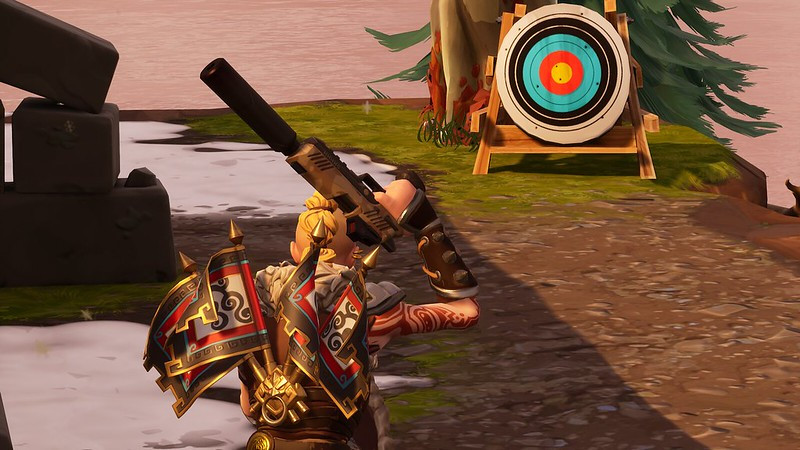Top 10 Tips for Mastering Fortnite: A Beginner's Guide
- 786

Fortnite is one of the most popular games in the world right now, and it's easy to see why. With its fast-paced gameplay and addictive mechanics, it's no surprise that millions of players have jumped into the battle royale.
However, for beginners, the game can be overwhelming. There's a lot to learn, and it can be challenging to keep up with experienced players. Fear not, though, as we've compiled a list of the top 10 tips for mastering Fortnite. From building to looting, we've got you covered.
1. Learn How to Build
.jpg) The building is one of the core mechanics of Fortnite, and it's essential to master if you want to survive in the game. The building can help you defend yourself from enemy fire and give you a height advantage when trying to take out enemies.
The building is one of the core mechanics of Fortnite, and it's essential to master if you want to survive in the game. The building can help you defend yourself from enemy fire and give you a height advantage when trying to take out enemies.
Start by practicing the basic structures, such as walls, floors, and ramps. Once you've mastered these, move on to more advanced techniques like editing and turbo-building.
2. Always Check Your Surroundings
Fortnite is all about survival, and the best way to do that is by being aware of your surroundings. Always make sure to check your back, sides, and above you for enemies. Use your headphones to listen for footsteps and gunfire.
Also, use the camera to look around you, especially when you're looting buildings or gathering resources. Being aware of your surroundings can save your life and help you spot enemies before they spot you.
3. Practice Your Aim
 In Fortnite, accuracy is everything. You need to be able to hit your shots if you want to take down enemies efficiently. Spend some time practicing your aim in the game's training mode or creative mode. This will help you get comfortable with the game's mechanics and improve your accuracy. You can also adjust your mouse sensitivity in the settings to find a comfortable level for you.
In Fortnite, accuracy is everything. You need to be able to hit your shots if you want to take down enemies efficiently. Spend some time practicing your aim in the game's training mode or creative mode. This will help you get comfortable with the game's mechanics and improve your accuracy. You can also adjust your mouse sensitivity in the settings to find a comfortable level for you.
4. Choose Your Landing Spot Wisely
When you start a match in Fortnite, you need to choose where to land. It's essential to pick a spot that will give you the best chance of survival. Avoid landing in highly crowded areas, as they tend to be the most dangerous. Instead, aim for areas with good loot and fewer enemies.
Also, try to land near a vehicle, so you can make a quick escape if things go south.
5. Know When to Engage and When to Disengage
One of the most important skills to master in Fortnite is knowing when to engage in a fight and when to disengage. Sometimes, it's better to avoid a fight altogether, especially if you're low on health or ammo.
Other times, you might want to take the fight to your enemy, especially if you have the advantage. Knowing when to engage and when to disengage can make all the difference in the game.
6. Stay Calm Under Pressure
 Fortnite is a fast-paced game that can be intense at times. It's essential to stay calm under pressure and not let your nerves get the best of you. Take deep breaths and focus on your gameplay.
Fortnite is a fast-paced game that can be intense at times. It's essential to stay calm under pressure and not let your nerves get the best of you. Take deep breaths and focus on your gameplay.
Don't panic when you're in a fight, as this can lead to poor decision-making and mistakes. Stay calm, and you'll be able to make better decisions and come out on top.
7. Use Your Resources Wisely
In Fortnite, resources like wood, stone, and metal are crucial to your survival. You need them to build structures, create a cover, and defend yourself from enemy fire. Make sure to use your resources wisely, as they are limited.
Don't waste them on unnecessary structures or use them all at once. Use them strategically to give yourself the best chance of survival.
8. Always Be on the Move
In Fortnite, standing still is a death sentence. You need to be constantly on the move, whether you're looting, gathering resources, or engaging in a fight. Moving targets are harder to hit, and they give you a better chance of survival.
Always be aware of your surroundings and try to move to cover or high ground whenever possible.
9. Play with a Squad
 Playing with a squad can give you a significant advantage in Fortnite. You can coordinate your attacks, cover each other's backs, and share resources. You can also revive each other if one of you goes down.
Playing with a squad can give you a significant advantage in Fortnite. You can coordinate your attacks, cover each other's backs, and share resources. You can also revive each other if one of you goes down.
If you're new to the game, find a group of friends or join a community to play with. Playing with a squad can make the game more enjoyable and increase your chances of survival.
10. Don't Give Up
Finally, don't give up. Fortnite is a challenging game, and it can be frustrating at times. You will die a lot, but that's part of the learning process. Keep practicing, keep improving, and don't give up. With time, you'll become a Fortnite master.
In conclusion, mastering Fortnite takes time, patience, and practice. By following these top 10 tips, you'll be on your way to becoming a better player. Remember to learn how to build, check your surroundings, practice your aim, choose your landing spot wisely, know when to engage and when to disengage, stay calm under pressure, use your resources wisely, always be on the move, play with a squad, and don't give up. With these tips, you'll be a Fortnite pro in no time.
